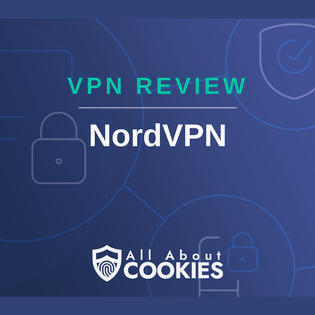Advertiser Disclosure
All About Cookies is an independent, advertising-supported website. Some of the offers that appear on this site are from third-party advertisers from which All About Cookies receives compensation. This compensation may impact how and where products appear on this site (including, for example, the order in which they appear).
All About Cookies does not include all financial or credit offers that might be available to consumers nor do we include all companies or all available products. Information is accurate as of the publishing date and has not been provided or endorsed by the advertiser.
Editorial Policy
The All About Cookies editorial team strives to provide accurate, in-depth information and reviews to help you, our reader, make online privacy decisions with confidence. Here's what you can expect from us:
- All About Cookies makes money when you click the links on our site to some of the products and offers that we mention. These partnerships do not influence our opinions or recommendations. Read more about how we make money.
- Partners are not able to review or request changes to our content except for compliance reasons.
- We aim to make sure everything on our site is up-to-date and accurate as of the publishing date, but we cannot guarantee we haven't missed something. It's your responsibility to double-check all information before making any decision. If you spot something that looks wrong, please let us know.
The digital age has brought many innovations, including the ability to share and download files via torrenting. However, torrenting comes with potential risks, from malware infections to your internet service provider (ISP) throttling your internet connection.
Torrenting can be a dangerous game if you're not careful and protected. Fortunately, by equipping yourself with tools like a top-tier virtual private network (VPN), antivirus and other cybersecurity measures, the road to safe torrenting becomes clearer. We’ll teach you how to torrent safely step by step and recommend the best VPNs and antivirus programs for torrenting.
Connect to a VPN
Configure your VPN for safe torrenting
Download a reliable torrent client
Visit a safe file-sharing website
Download trusted torrent files
Scan your torrent files with an antivirus
FAQs on torrenting safely
Bottom line
How to torrent safely
Torrenting allows you to download and share vast amounts of data, from movies and music to software and documents. While torrenting seems like a straightforward process, doing so without safety precautions can open a Pandora's box of cyberthreats and risks, including:
- Potential malware attacks
- Accidental downloads of viruses or other malicious files
- Unwanted access to your personal and sensitive data
- Legal repercussions tied to copyrighted material
- ISP throttling
Beyond the immediate threats of viruses or malware, there's the silent observer — ISPs. With their expansive surveillance capabilities, ISPs not only keep a watchful eye on your online activities but can also throttle your internet speed or even penalize you for torrenting certain materials.
For a safer torrenting experience, follow these step-by-step instructions:
- Protect your digital footprint: Begin by understanding that every device connected to the internet has an IP address. This address can reveal details about your activities, location, and more. Ensure you mask your real IP to keep your actions private. You can check your IP address on https://whatismyipaddress.com/.
- Use a reliable VPN: With a VPN, you can route your internet connection through a secure VPN server, and ensure that ISPs or cybercriminals can't trace back to you.
- Choose a credible torrent client: Not all torrent clients are created equal. Choose reputable software that has received approval from the online community and is known for being free of bundled malware.
- Select reputable torrent sites: Always source your torrents from well-regarded sites. Check user reviews and comments for insights on the file's credibility.
- Use antivirus software and scan every download: Before opening any downloaded torrent file, scan it with antivirus software to detect and quarantine potential threats.
- Stay Informed: Laws around torrenting vary globally. Be aware of the legal landscape in your country to avoid inadvertent infringements.
By adhering to these guidelines, you can enjoy the benefits of torrenting while minimizing the associated risks.
Connect to a VPN
For safe torrenting, having a VPN is a must. By using a VPN, your IP address becomes obscured, which greatly reduces the ability of any party (even your ISP) to monitor your online actions and conceals your internet activities from prying eyes. But how does this work?
When you connect to a VPN, your internet traffic is rerouted through a secure, encrypted tunnel to a remote server. This process effectively masks your original IP address and replaces it with one from the VPN server.
To harness the power of a VPN, follow these steps:
- Select a trustworthy VPN service. Notable names in the VPN industry include NordVPN and Surfshark, among others. (Tip: Consider a VPN service provider in a P2P-friendly country.)
- After subscribing, download and install the respective VPN software on your device.
- Launch the application and connect to a server, preferably one closer to your location for optimal speeds.
- Once connected, your IP address is altered, reflecting the VPN server's location. Verify your new IP address at https://whatsmyipaddress.com.
With an active VPN connection, not only is your identity veiled, but your data is also encrypted. This means that even if malicious actors intercept your data, deciphering it becomes a challenging task. Moreover, ISPs, known for monitoring online behaviors, are left in the dark about your activities, preventing them from potentially throttling your connection due to your torrenting activities.
The best VPNs for safe torrenting
A torrenting VPN should have an intuitive interface that’s easy to navigate, fast download and upload speeds, WebRTC and DNS leak protection to ensure your true physical IP address remains hidden, and a no-logs policy that’s been audited to ensure the confidentiality of your internet activities.
Moreover, your VPN should incorporate strong encryption techniques to safeguard your data, like AES-256 encryption. Another essential feature your VPN should have is a kill switch, which acts as a safety net, halting your connection should the VPN unexpectedly disconnect.
To enhance torrenting efficiency, the VPN should also offer servers that are optimized for P2P activities. On top of these features, having attentive customer service and broad compatibility across various devices and operating systems is crucial to delivering a consistent and safeguarded torrenting journey.
Here are some VPN providers that stand out for torrenting:
- NordVPN: NordVPN is lauded for its fast connection speeds and the added layer of security through its double VPN feature. It also boasts a kill switch and a staunch no-logs policy, ensuring your torrenting remains truly private.
- CyberGhost: CyberGhost has a user-friendly app with dedicated torrenting profiles, ensuring optimal server connections for torrenting. Alongside its no-logs policy, it offers an automatic kill switch, fortifying its reputation for security during torrenting sessions.
- ExpressVPN: ExpressVPN shines with its unrivaled download and upload speeds, making it a favorite among frequent torrenters. Its inherent leak protection, combined with a no-logs policy and an integrated kill switch, ensures you can torrent without a shred of worry.
By selecting a reliable torrenting VPN, you can create a safe and secure torrenting experience.
-
High-quality VPN offering safety and speed
-
Loads of servers for multiple connection options
-
Works with popular streaming services, including Netflix
-
Too many confusing plans
Configure your VPN for safe torrenting
Before delving into the world of torrenting, it's important to tweak certain VPN settings to ensure maximum security.
First and foremost, always activate the kill switch — this safety net ensures that your internet connection is instantly severed if your VPN happens to disconnect, preventing any unintentional exposure.
Second, select a secure VPN protocol like OpenVPN or WireGuard, known for their balance between speed and security.
Lastly, ensure that your VPN has DNS and IP leak protection enabled. This prevents your actual IP address and online activities from being inadvertently exposed.
By setting your VPN up for torrenting, you're taking proactive measures to create a fortified environment, allowing you to torrent with both confidence and peace of mind.
Download a reliable torrent client
A torrent client is a specialized software application designed to manage and facilitate the downloading and uploading of large files using the BitTorrent protocol. While it serves as the very foundation of torrenting, not all clients are created equal. Some clients come with an array of features aimed at ensuring user safety, while others might be bundled with unwanted extras or lack crucial protective features. It's essential to be discerning in your choices.
Reputable torrent clients such as qBitTorrent and uTorrent have garnered trust from the torrenting community over the years, due to their commitment to user security and lack of bundled malware or intrusive ads. Deluge and Tixati are reputable torrent clients known for their user-friendly interfaces, robust security features, and commitment to providing a malware-free torrenting experience.
Visit a safe file-sharing website
Navigating the internet in search of trustworthy, reliable torrenting websites can be akin to walking a tightrope. While many sites beckon with the promise of free and vast content, not all of them prioritize user safety and security. Therefore, it’s important to access a genuine and secure torrenting site, not just to download high-quality files, but also to protect your device and data from potential malware, intrusive ads, and other cyberthreats.
For those venturing into the world of torrents, starting on the right foot is crucial. Trusted sites like The Pirate Bay, 1337x, and RARBG have stood the test of time, proving themselves to be reliable hubs for content. However, always approach with caution, regularly updating your knowledge on the safest platforms, and being aware of the changing landscape of the torrenting world. Lastly, when you’re torrenting with a VPN, you're well on your way to a secure torrenting experience.
Download trusted torrent files
When you're on the hunt for the perfect torrent, it's easy to get lost in the sea of options. Remember that not all torrents are created equal, and the key to a successful download often lies in the details:
- Seeders vs. leechers: Always pay attention to the seeder-leecher ratio. A high number of seeders compared to leechers often hints at a dependable and swifter download.
- File size and type: Along with checking the file format, evaluate the file size. If you're downloading a movie and it's only a few kilobytes, that's a red flag. Always ensure the file size matches what you'd expect for the content you're downloading.
- User reviews and comments: Trusted torrenting platforms often have a vibrant community of users who share their experiences. Before hitting download, take a moment to go through these comments. They can provide insights into the file's quality, authenticity, and safety.
- Download history: A torrent that has been downloaded numerous times and has a wealth of positive feedback is likely a safer bet. Torrents that are brand new or have very few downloads might require a bit more scrutiny.
Lastly, always trust your instincts. If something feels off or too good to be true, it might be worth finding another source or doing a bit more research before proceeding with the download. Safe torrenting is as much about knowledge as it is about vigilance.
Scan your torrent files with an antivirus
When downloading torrents, it's essential to recognize the potential risks involved. While many files are harmless, some can contain hidden threats. Antivirus software can help identify and mitigate these risks. As you download a torrent, you're obtaining a file whose origin might not be entirely known. With an antivirus, you can thoroughly scan torrent downloads for possible threats such as malware or trojans.
Before accessing any torrent file, running it through an antivirus check is a prudent step. This not only helps protect your device but also ensures the safety of your data. Along with a reliable VPN, this approach offers a more secure torrenting experience, reducing the chances of encountering harmful content.
The best antivirus programs for safe torrenting
The antivirus programs we recommend for torrenting excel at providing real-time threat detection, guaranteeing minimal false positives, and maintaining a user-friendly interface. Here are some of the standout antivirus choices for torrent enthusiasts:
- TotalAV: TotalAV is revered for its swift scanning capabilities and user-friendly apps, which can be a breeze if you’re downloading antivirus for the first time.
- Bitdefender: On top of being a top-scoring antivirus, Bitdefender also provides other cybersecurity features including its own VPN, password manager, and more.
- McAfee: McAfee offers a blend of efficient scanning and malware protection, making it a great choice for those keen on safeguarding their torrenting activities.
Pairing your torrenting activities with a reputable antivirus software ensures that you're shielded from potential cyberthreats at all times. It's always better to be proactive about cybersecurity than to face the repercussions of oversight.
-
High level of antivirus protection
-
Protection from malicious viruses, malware and dangerous websites
-
User-friendly interface and overall app
-
Lacks firewall protection
FAQs on torrenting safely
Is a VPN enough to torrent safely?
While a VPN provides essential protection, it's recommended to use trusted torrent clients and torrent sites, as well as antivirus software to scan your files for malware.
Can I get caught torrenting?
Without protective measures like a VPN, yes, you can be caught torrenting. Your IP address can be traced back to you by your ISP.
Is torrenting illegal in the U.S.?
While torrenting is not illegal in the U.S., it’s unlawful to download copyrighted materials without the necessary permissions. Always ensure you have the right to share or download content.
Bottom line
Engaging in torrenting, especially with reputable platforms like BitTorrent, can be an effective way to share and download files. You should use a VPN to not only shield your IP address from ISPs and hackers, but also optimize your download speeds. You should also use antivirus software while torrenting, to scan your downloaded files for malware and the legal nuances associated with downloading torrents.
While torrent clients provide the technical means, always ensure your chosen torrent sites are reputable to avoid copyright issues. For those keen on maintaining safety while enjoying the benefits of torrenting, our guide on the best VPNs for torrenting is a must-read, offering insights into staying protected and adhering to the law.
-
High-quality VPN offering safety and speed
-
Loads of servers for multiple connection options
-
Works with popular streaming services, including Netflix
-
Too many confusing plans






